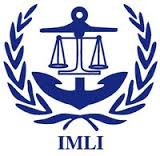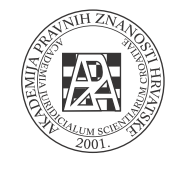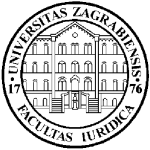Organiser
-
Croatian Academy of Legal Sciences
The Croatian Academy of Legal Sciences is a non-profit non-governmental organisation. It was founded at the Founding Assembly on the 7th November 2001 by 52 founding members. The Founding Assembly was held at the time of the celebration of the 225th anniversary of the Faculty of Law in Zagreb. According to its Articles of Association, the Academy has full members, honorary members and associates. A full member must be a Croatian citizen with a Ph. D. degree in social sciences, dealing with legal science and significantly contributing to academic research in the field of law (academic papers and books published in legal or academic journals or reference books, participation in scientific research projects etc.) and the development of Croatian legal science. An honorary member of the Academy may be a foreign legal scientist significantly contributing to the development of Croatian legal science or its international reputation. An associate may be a Croatian citizen with a Ph. D. or an LL. M. degree in the field of social sciences engaged in legal research. The numbers of full members, honorary members and associates are limited by the Articles of Association to 140, 15 and 70 legal scientists respectively. Academy membership has gradually increased and today there are 133 full members and 26 associates. The President of the Academy is Prof. emeritus dr. sc. Željko Horvatić.
The Academy has organised, independently and in cooperation with other associations, institutions or organisations, a number of academic and professional symposia dealing with contemporary legal themes such as the combat against corruption, medically assisted procreation, adjudication of war crimes, local self-governance and decentralisation, etc. Besides organising academic and professional events, the Academy actively participates in legal research projects (e.g. judicial and legal research policy, joint criminal enterprise in international criminal law, etc.). The Academy intensively cooperates with numerous distinguished and influential institutions and associations such as the Croatian Academy of Sciences and Arts, Croatian Academy of Medical Sciences, Croatian Academy of Technical Sciences, Academy of Forestry Science, Croatian Association of Criminal Sciences and Practice etc. The Academy frequently publishes press releases dealing with controversial legal issues such as the maritime delimitation between Croatia and Slovenia, the proposed package of laws regulating science and higher education, the status of the Croatian legal system after joining the EU etc. It should be noted that the members of the Academy hold various distinguished and responsible positions and functions not only in academic institutions, but also in the public and political life of the country. Amongst the members of the Academy there are several professores emeriti, fellows of the Croatian Academy of Sciences and Arts, judges of the Croatian Constitutional Court and the European Court of Human Rights. The President of the Republic of Croatia, prof. dr. sc. Ivo Josipović is one of the founding members and a full member of the Croatian Academy of Legal Sciences.
Co-organisers
Faculty of Law in Zagreb
The Faculty of Law was established in 1776 and is the oldest of the four faculties of law in the country and one of the oldest institutions of the University of Zagreb. While it remains proud of its fine tradition, it seeks to be a modern institution engaged in cutting-edge research and education. The Faculty of Law offers seven different types of study programme – three in law, three in social work and one in public administration.
The mission of the Faculty of Law in Zagreb is to educate competent and qualified experts in the field of law, social work and public administration, who will contribute to the advancement of practice, education and academic research with their knowledge and skills. For a number of years the Faculty has trained the best students by developing study programmes of all levels based on the latest scientific and research, highest professional standards and principles of ethics. It seeks to foster excellence through international cooperation and to create a stimulating intellectual environment for successful learning and research, as well as for personal development. The Faculty has concluded agreements with more than 130 institutions of higher education from Europe and other continents. Its members participate in the work of foreign research institutions and cultivate co-operation with scientists in other countries. The Library of the Faculty of Law is particularly rich in sources for scientific research. Today it has almost 200,000 holdings which cover all fields of law and include numerous rare items, and is considered as one of the best law libraries in this part of Europe in terms of the number, variety and quality of its holdings.
As part of its educational, academic and professional activities, the Faculty carries out a number of scientific and professional projects and research studies, it organises local and international academic and professional seminars, conferences and symposia, and offers programmes of professional lifelong education and development. The Faculty also conducts some additional activities ensuring the required standard of the system of higher education with the highest level of organisation and public responsibility.
In its third century of existence, the Faculty of Law in Zagreb has proved to be a source of Croatian nation-building spirit and free thought, the guardian of Croatian culture and the representative of the Croatian legal school as one of the centres of the Mid-European legal tradition, and as such it is distinguished in the country and abroad. Its members greatly contribute to the creation of the Croatian legal system, establishment of the rule of law and the education of new generations of lawyers based on the best European legal traditions.
IMO International Maritime Law Institute
 The IMO International Maritime Law Institute was established in 1988 under the auspices of the International Maritime Organization, a specialised agency of the United Nations (through an international agreement between IMO and the Government of Malta).
The IMO International Maritime Law Institute was established in 1988 under the auspices of the International Maritime Organization, a specialised agency of the United Nations (through an international agreement between IMO and the Government of Malta).The Institute is an international centre for the training of specialists in maritime law. It also contributes to the development and dissemination of knowledge and expertise in international maritime law, with special reference to the international regulations and procedures for safety and efficiency of shipping and the prevention of marine pollution.
The Institute provides suitably qualified candidates, particularly from developing countries, with high-level facilities for advanced training, study and research in international maritime law. It also focuses on legislative drafting techniques designed to assist participants in the process of incorporating international treaty rules into domestic law.
Although many developing countries have reasonable numbers of legally trained persons, they do not always have the required numbers of persons with the necessary specialization or expertise in maritime law. To meet these needs, IMO has included, as a vital part of its technical co-operation programme, projects for the provision of technical advice and assistance in maritime law and legislation. Under this programme, advice and assistance have been provided on request to States on the planning and preparation for new or updated maritime legislation. Such advice and assistance have been provided by IMO’s interregional advisers or, where appropriate, by short-term consultants or experts recruited in consultation with the Government concerned.
IMLI maintains strong institutional links with national and international organisations and corporations pre-eminent in the field of shipping. Organisations such as the Nippon Foundation, IMO and Comité Maritime International (CMI) are not only resources for necessary fellowships for IMLI students, but also provide the Institute with eminent visiting fellows in the field of shipping law. CMI’s Past President, Mr. Patrick Griggs, is one such person who donates valuable time to lecture at the Institute. Other such organisations which provide valuable support to the Institute are the European Union (EU), the International Labour Organisation (ILO, the Maritime Industries Department) and the United Nations Commission for Trade and Development (UNCTAD). Furthermore, the Institute maintains extensive links with national maritime law associations such as the British Maritime Law Association, the Maritime Law Association of Singapore, the Slovene Maritime Law Association, the Canadian Maritime Law Association and the American Maritime Law Association. It is these links with national and international organizations, which are the cornerstone of IMLI’s position as the foremost educational institute in international maritime law.












